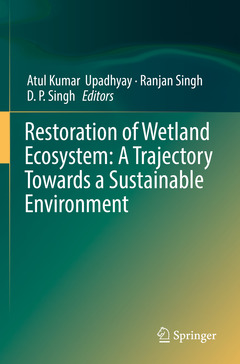Restoration of Wetland Ecosystem: A Trajectory Towards a Sustainable Environment, 1st ed. 2020
Coordonnateurs : Upadhyay Atul Kumar, Singh Ranjan, Singh D. P.

Atul Kumar Upadhyay is a scholar in the field of environmental science. He completed his PhD in the field of phytoremediation and constructed wetland technology at CSIR-National Botanical Research Institute, Lucknow jointly with Kumaun University, Nainital, India. He also holds a postgraduate Botany degree from Dr. RML Avadh University, Faizabad, India. Dr. Upadhyay’s research interests include the construction and design of wetland and plant-based management of water and soil pollution as well as river water rejuvenation, wastewater treatment, wetland design and soil management. He has published a number of research papers, articles and chapters in respected national and international journals. Currently, Atul Kumar Upadhyay is working as a Postdoctoral Fellow (Science and Engineering Research Board, Department of Science and Technology, India) at the department of Environmental Science, BBAU (a central university), Lucknow, India, investigating various aspects of sustainable phytoremediation and bioenergy production.
Ranjan Singh is a senior PhD student at the Department of Environmental Science at Babasaheb Bhimrao Ambedkar University (a central university), Lucknow, India. He received his B.Sc. (2012) in Botany, Zoology and Chemistry from VBS, Purvanchal University, India, and his postgraduate degree (2014) in Environmental Science from VBSPU, Jaunpur. His research interests include plant physiology, stress physiology and phycological-based biofuel production, with a focus on the role of biomarkers of abiotic stress in microalgae and its biofuel production potential. He has published original research and review articles in peer-reviewed high impact journals along with many national and international book chapters and magazine articles on wetland management, biofuel crises and sustainable management of pollutants in soil and water.
Devendra Pratap Singh is the former Head and Dean of the School for Environment
This book discusses the potential of green technology in waste management, wetland restoration and presents the latest advances toward sustainable development
Highlights a broad range of strategies to achieve a sustainable environment
Presents the latest research on wetland science, waste management, carbon sequestration and bioremediation around the world
Date de parution : 08-2020
Ouvrage de 247 p.
15.5x23.5 cm
Disponible chez l'éditeur (délai d'approvisionnement : 15 jours).
Prix indicatif 105,49 €
Ajouter au panierDate de parution : 07-2019
Ouvrage de 247 p.
15.5x23.5 cm
Disponible chez l'éditeur (délai d'approvisionnement : 15 jours).
Prix indicatif 147,69 €
Ajouter au panier


